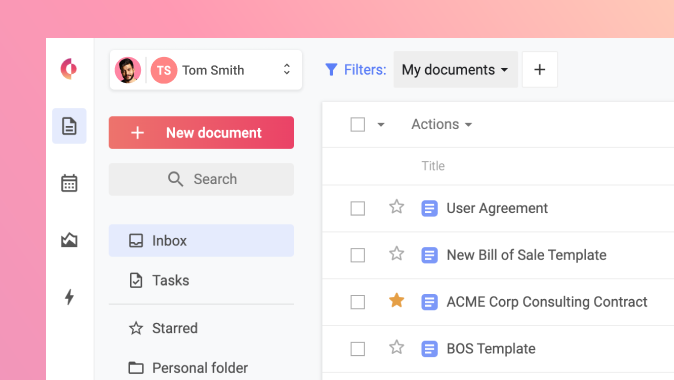5 Best Practices for Obtaining Contract Renewal Opportunities
When it comes to contract renewals, it’s much more than just a yearly check-in. How can the renewal phase of a contract be an opportunity for more revenue? What about increased loyalty in relationships?
After everyone is satisfied, the agreement is signed. Now, there’s one more thing to do: track the renewal clause. The healthiest business relationships are always looking ahead to what’s coming next, for starters.
In a contract’s lifecycle, that means the renewal. Addressing this opportunity means reviewing what’s occurred over the history of that contract. Additionally, you need to consider the advantages and drawbacks of renewing an agreement. To help you manage this process, we have created a list of best practices, however, let’s start with discussing what a contract renewal actually is.
What is Contract Renewal?
Contract renewal is the process of extending or renewing an existing agreement between two parties. It involves assessing the performance of the agreement over its lifetime, renegotiating any changes that may be necessary, and executing a new agreement to replace the old one.
Renewals can include duration, pricing, or other terms of the agreement that have to be updated to meet the needs of both parties. Ultimately, this process allows for an ongoing relationship between two entities that benefits both sides.
Below are a few guidelines to capitalize on a contract renewal opportunity.
1. Communicate and Build Relationships from the Start
First of all, renewals factor in well before the deadline comes up. They start the moment the agreement is first drafted. Communication is a key baseline as the relationship starts. From that point, regular communication is the next step. Once everyone signs the contract, maintaining the conversation and making sure both parties are satisfied improves the chances of renewal.
Renewals are typically the easiest option for both parties. First of all, one side doesn’t have to look for a new supplier, and the other side continues to get revenue. However, the renewals aren’t worth it if the relationship is bad or the contract isn’t valuable.
2. Leverage CRM and CLM Platforms
Next, powerful analytics from a CRM platform such as Salesforce or HubSpot give insights into the benefits of each agreement. A CRM should integrate with a contract lifecycle management (CLM) platform. For one thing, a CLM tool tracks the entire duration of an agreement and determines whether or not it is worth renewing.
Furthermore, an integration should provide data on value, efficiency, and contract deadlines. With this information, both sides have all the information they need to determine if a contract adds value for teams.
3. Establish Automated Alerts
Smaller teams may be able to keep track of agreements with calendar reminders. But once a company grows, the number of contracts grows as well, into the thousands and even tens of thousands. No calendar is able to effectively manage all these reminders in an organized manner.
Luckily, this is where contract lifecycle management, or CLM comes in. Good contract management software should have automated deadline alerts that will tell you when renewals are coming up. Obviously, deadline summaries provide visibility into all the upcoming contracts that are expiring. That way, there is plenty of time to prepare for renewal options.
4. Hold Yearly Reviews
Regardless of what the contract renewal dates are, evaluate every agreement at least once a year. This provides perspective on the status of the contract. Also, it outlines what the value is for a company, and if a renewal is appropriate.
Clearly, planning ahead is key to renewing agreements. It needs to be done in a way that continues a successful business relationship, even if the decision is to not renew.
5. Refine the Contract
Finally, even the most valuable contracts often need improvements. Budgets, products, and strategies change, and a contract keeps up with the pace of business. The yearly reviews should identify what needs to be changed in the agreement, if anything.
At that point, you can also consider update opportunities. These changes will most likely only need a quick legal review. However, they have a significant impact on revenue and the contract’s overall worth.
Renewals are all about continuing valuable relationships. Also, are both parties satisfied and interested in continuing a good relationship? Is the agreement advantageous for both parties? If so, these 5 steps should help maintain a good renewal cycle.
In order to get the best out of your contract renewals and have an effective contract management process, you might also consider using a CLM tool.
How Does CLM Software Help With Renewing Contracts?
In our list of best practices above, we have mentioned the various features of CLM tools that can help with renewing agreements. Let’s go over them in some more detail.
Contract management software features that support contract renewals:
- Automated deadline alerts
- Deadline reports
- Automatic contract renewals
- Electronic signatures
Automated deadline alerts
CLM Software’s automated deadline alerts make renewing agreements a breeze. With these alerts, users are notified ahead of time of any upcoming deadlines, helping them stay organized and save time that would otherwise be spent on manual reminders. Furthermore, automated deadline alerts reduce the chances of overlooking crucial renewal dates, ensuring a smooth and hassle-free process.
Deadline reports
Contract deadline reports allow us to have a clear overview of all the upcoming deadlines. With deadline reports, businesses can easily identify key deadlines associated with renewals, giving them ample time to evaluate contract performance and negotiate the best terms before expiration. By enabling data-driven decision-making, CLM tools empower companies to stay ahead of their contractual obligations.
Automatic contract renewals
By automating renewals, CLM software eliminates the need for manual tracking and management, ensuring crucial deadlines are never missed. This solution not only accelerates the renewal process but also reduces the risk of costly contractual oversights.
Electronic signatures
Using electronic signatures for contract renewal processes can improve the efficiency of the renewal. Electronic signatures enable faster, more secure collaboration between parties, reducing the time it takes to renew an agreement. Electronic signatures foster seamless collaboration among parties, enabling instant access to documents and rapid execution of agreements.
The contract renewal process is an important part of contract management. It can be an opportunity for more revenue and better relationships. By following these best practices and utilizing CLM tools, you can significantly reduce the time and effort required to manage contract renewals and make them more efficient. This can lead to better contracts, smoother business operations, and increased profitability.




